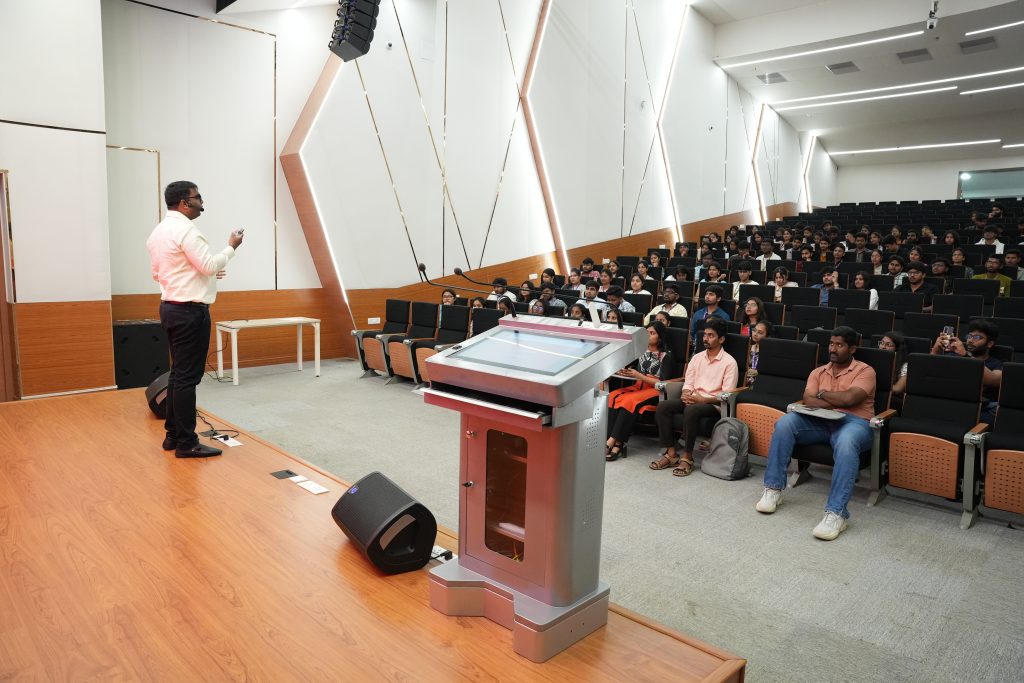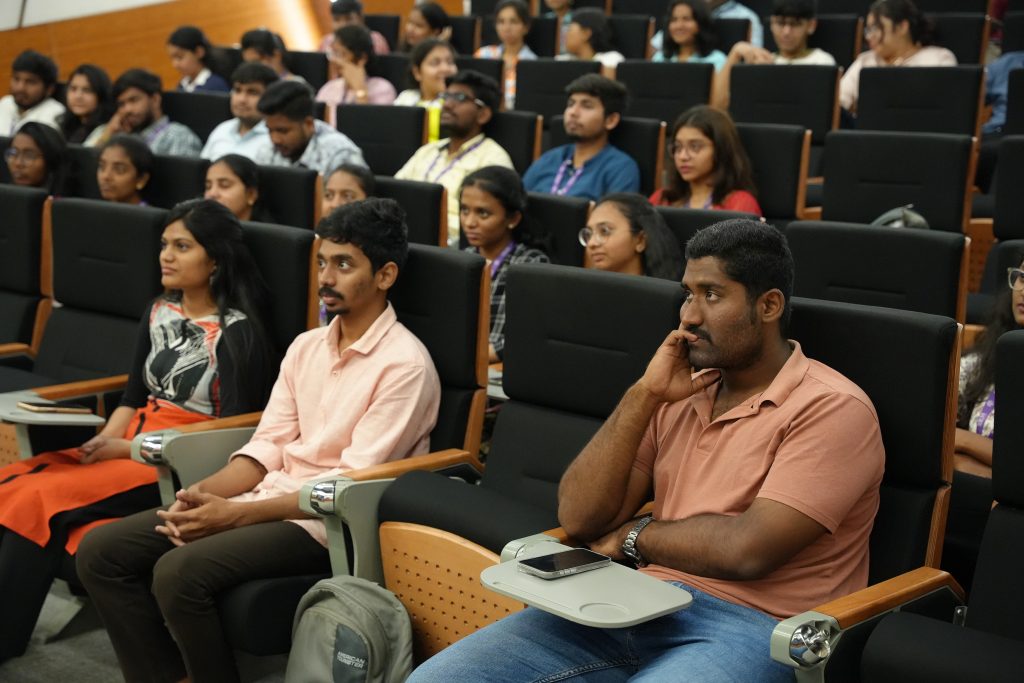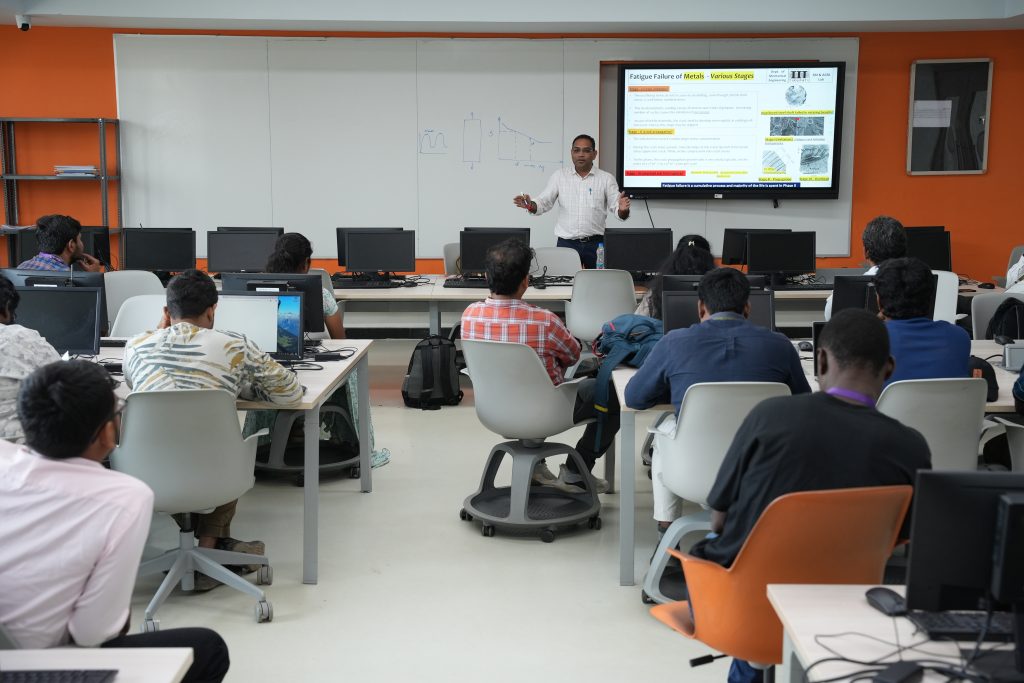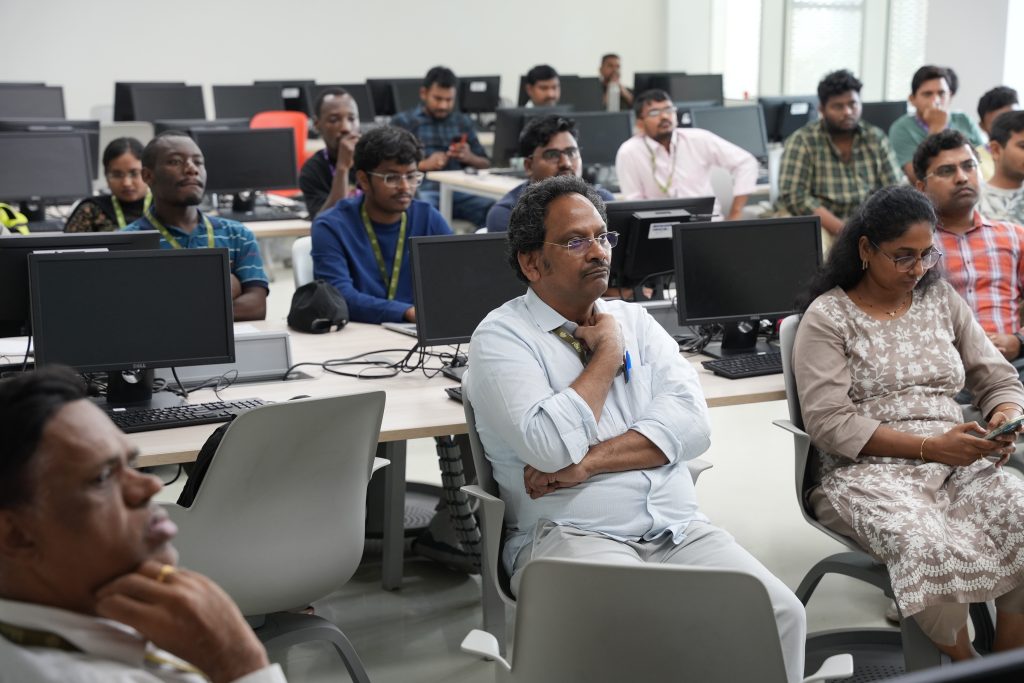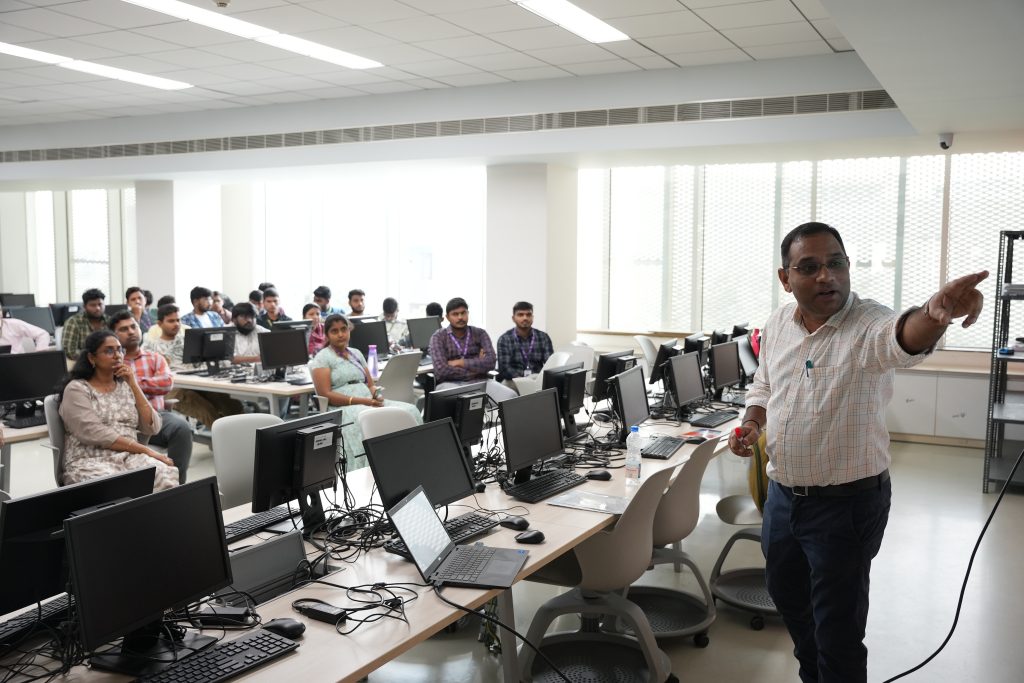Guest Talk on an Overview of HR in Corporate
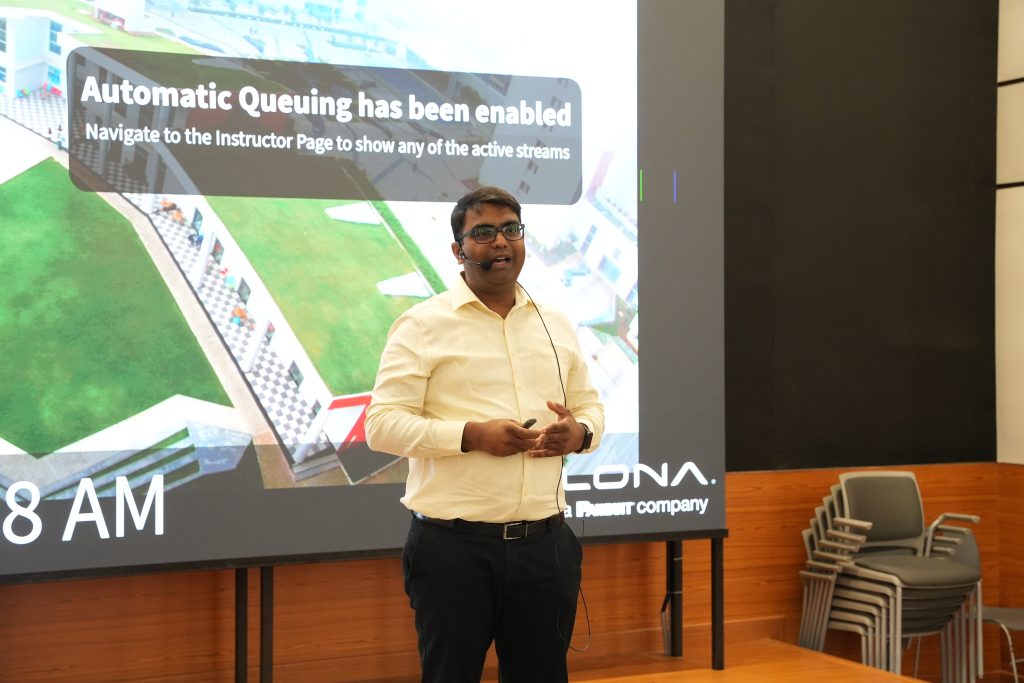
The Department of Management organised a Guest Talk on “Business Communication; Overview of HR Department in a Corporate”. Mr Sannu Francis, General Manager of Orient Cement, delivered the session on the role of HR as a strategic partner, aligning talent management with overall business objectives.
Mr Francis remarked that the role of HR begins with manpower planning; determining the right number of employees, structuring budgets, and forecasting production needs based on market trends. HR is responsible for recruiting and onboarding the right talent through sourcing, competency-based interviews, and psychometric testing. Once onboard, HR focuses on developing employees through training and learning initiatives that enhance knowledge, skills, and attitudes. It manages performance by setting clear goals, conducting mid-year reviews, and overseeing annual appraisals, ensuring fairness and objectivity.
Additionally, he stated that HR administers compensation, benefits, and statutory payments while upholding compliance and legal standards. Beyond these functions, Mr Francis said that effective communication: verbal, nonverbal, written, and visual; is key to fostering strong relationships and engagement within the organization, making HR indispensable for driving business success.
The session gave a comprehensive overview of the significance of HR in a Corporate and the importance of business communication.
- Published in Departmental News, News, Paari Current Happenings, paari-guest-lectures
Exploring Composite Structures with Dr Subbareddy Daggumati
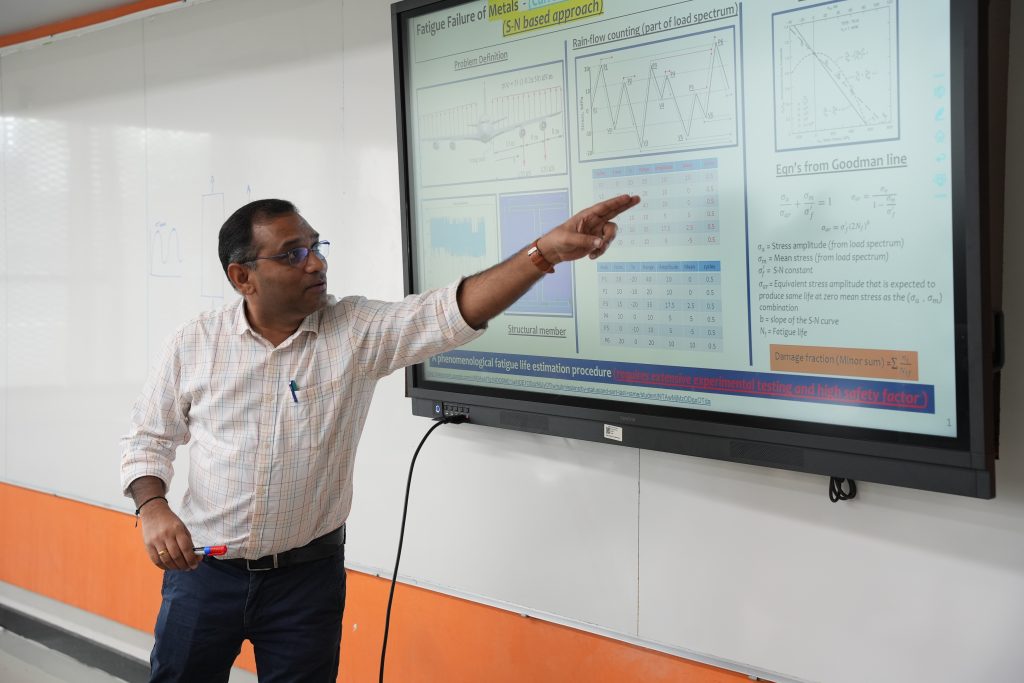
The Department of Mechanical Engineering hosted an invited talk on “Design of Composite Structures” on February 27, 2025. The session was delivered by Dr Subbareddy Daggumati, distinguished Associate Professor of the Department of Mechanical Engineering at Indian Institute of Technology (IIT) Tirupati, Andhra Pradesh, India. An expert in composite materials, structural mechanics, and computational modelling, Dr Subbareddy Daggumati, highlighted the significance of composite materials in aerospace, automotive, and structural applications in his talk.
The presentation covered key topics such as fatigue damage mechanisms, experimental analysis, predictive modelling, and recent advancements in composite material research. Participants, including faculty members, researchers, and students, actively discussed improving fatigue resistance through material selection, design optimization, and advanced testing techniques. A leading figure in advanced engineering research, Dr Subbareddy Daggumati also underscored the extensive research opportunities available for faculty, research scholars, and students interested in exploring the fatigue behaviour of composite structures. The event was highly informative, fostering academic exchange and encouraging further research into the fatigue behaviour of composite structures.
The event was presided over by Dr Lakshmi Sirisha Maganti, Head of the Department of Mechanical Engineering and Prof. Prakash Jadhav, Professor of the Department of Mechanical Engineering. The talk concluded with an interactive Q&A session, where attendees gained valuable knowledge on current challenges and future research directions in this field.
- Published in Departmental News, Mechanical Engineering NEWS, News
“A New Dawn of Water Sustainability”: 1st Water Elixir Meet 2025
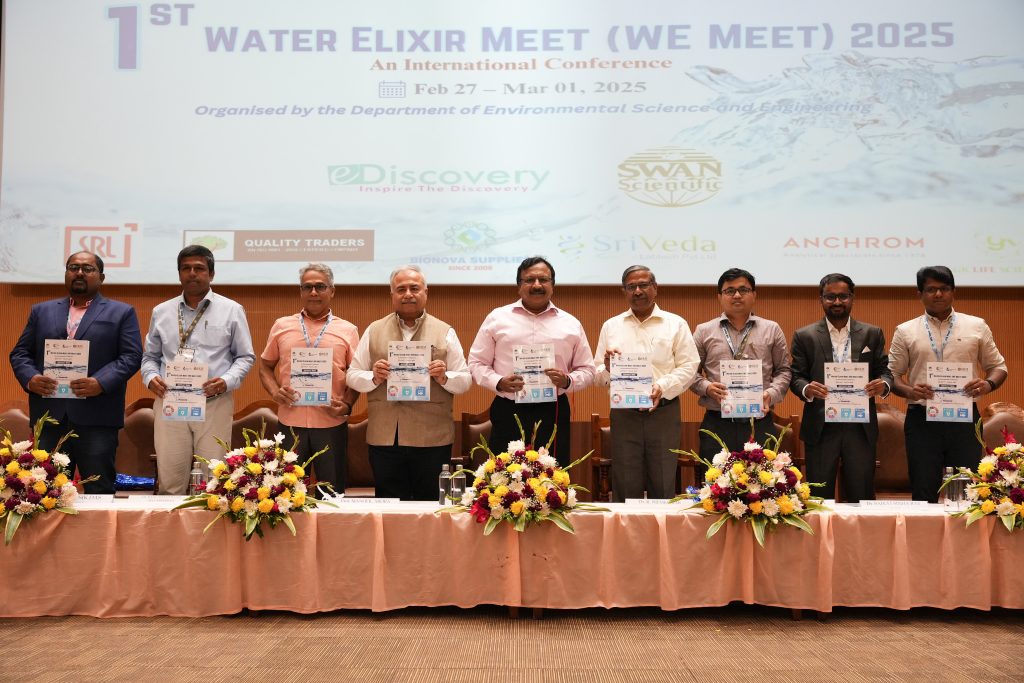
The Department of Environmental Science and Engineering hosted the 1st Water Elixir Meet (WE Meet 2025), a three-day international conference bringing together global minds to address one of the world’s most pressing challenges: water sustainability and security on Feb 27 – Mar 01, 2025. The conference was inaugurated by Prof. Rajasekhar Balasubramanian, Provost’s Chair Professor Group Head (Hydraulics, Hydrology and Climate Resilience), Department of Civil and Environmental Engineering, National University of Singapore.
“The available water quantity is decreasing, and the water quality is declining. There is a dire need to look into these parameters holistically and not separately. The We Meet 2025 is an ideal platform where scientists, researchers, policymakers, and industry leaders converge to address and manage global water resources efficiently and strategically,” stated Prof. Rajasekhar in his inaugural address.
WE Meet 2025 brought together more than 150 research abstracts and an esteemed lineup of global speakers, sharing groundbreaking insights into water resources, hydrogeology, and environmental sustainability. Prof. Kwang Ho-Choo from Kyunpook National University, South Korea, Prof. Shiao-Shing Chen from National Taipei University of Technology, Taiwan, Prof. Fulvia Chiampo from Politecnico di Torino, Italy, were some of the notable international speakers who delivered keynote sessions at the conference.
Prof. Manoj K Arora, Vice Chancellor, remarked beyond academic and research possibilities, WE Meet 2025 aimed at fostering global partnerships, innovative solutions, and cultural exchange. He stated, “WE Meet 2025 is a timely conference organised to address critical issues such as water resource management and water conservation.” Dr Rangabhashiyam Selvasembian, Head of the Department of Environmental Science and Engineering, also opined that this groundbreaking gathering fosters dialogue for impact. He said that the conference is a testament to the power of creative action in securing a sustainable tomorrow.
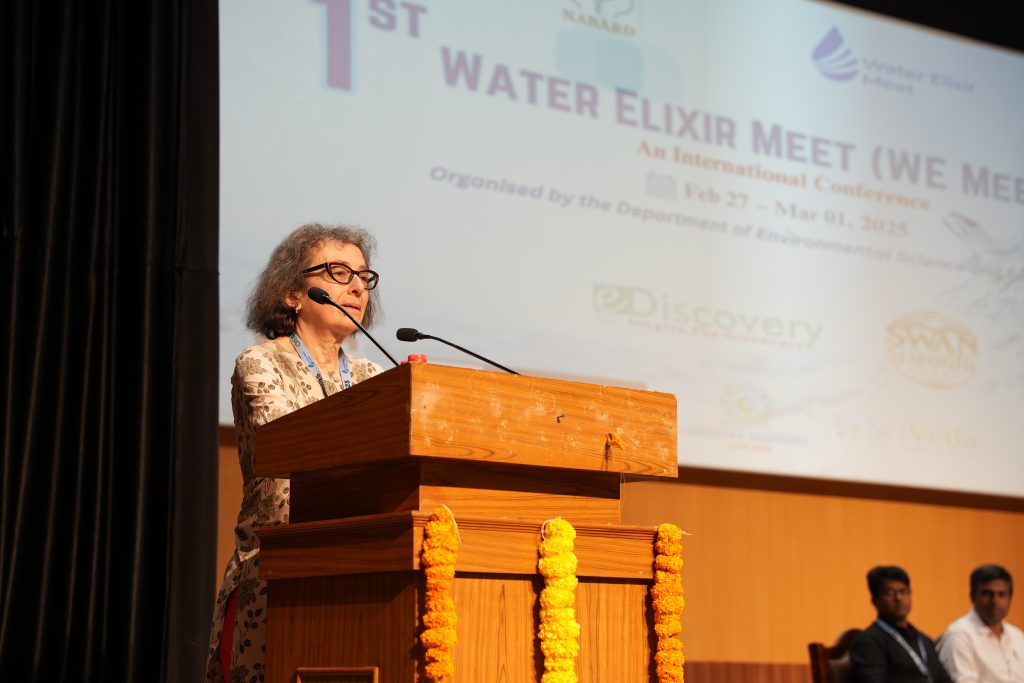
By showcasing cutting-edge technologies and driving policy advancements, WE Meet 2025 at SRM University-AP serves as a catalyst for real-world change. Exemplary research works such as the Best Oral Presentation and the Best Poster Presentation, were awarded top prizes at the valedictory ceremony. The conference also saw the participation of Registrar Dr R Premkunar, Dean – School of Engineering and Sciences, Prof. C V Tomy, Dean–Research, Prof. Ranjit Thapa, faculty, scholars and students of the varsity.
As the world grapples with increasing water challenges, this landmark international conference paves the way for a transformative journey to secure the future of water.
- Published in Departmental News, ENVS News, News, Research News
Trio Publish Patent on VR Based Therapy Systems
 The Department of Psychology at SRM University-AP is proud to announce the publication of the patent titled, “A System for VR-Based Psycho-Oncology Therapy with Real-Time Biofeedback and Cultural Adaptation” by Dr Ayesha Parveen Haroon and her Research Scholars-Ms Brilly Anto and Ms Keziah Mariyam Simon. This groundbreaking research introduces a virtual reality therapy system that integrates real-time biofeedback.
The Department of Psychology at SRM University-AP is proud to announce the publication of the patent titled, “A System for VR-Based Psycho-Oncology Therapy with Real-Time Biofeedback and Cultural Adaptation” by Dr Ayesha Parveen Haroon and her Research Scholars-Ms Brilly Anto and Ms Keziah Mariyam Simon. This groundbreaking research introduces a virtual reality therapy system that integrates real-time biofeedback.
Abstract
This research introduces a VR-based psycho-oncology therapy system that integrates real-time biofeedback and cultural adaptation to enhance the psychological well-being of cancer patients. The system utilizes virtual reality to create immersive therapeutic environments while continuously monitoring physiological indicators such as heart rate variability (HRV), skin conductance response (GSR), and respiratory rate to assess stress levels in real time. A processing unit analyzes this data using stress detection algorithms and selects personalized therapeutic interventions, including guided imagery, music therapy, mindfulness practices, and culturally relevant content. The system adapts dynamically to patient responses, ensuring an individualized approach to mental health support. Additionally, a cloud-based module securely stores therapy metrics for long-term monitoring and personalized care adjustments. This innovation offers a patient-centred, technology-driven intervention that enhances mental health outcomes, improves treatment adherence, and provides accessible psychological support for cancer patients in both clinical and home settings.
Explanation in layperson’s terms.
Cancer treatment can be emotionally challenging, leading to stress, anxiety, and depression. This research introduces a Virtual Reality (VR)-based therapy system that helps patients relax and manage stress through immersive environments like calming landscapes and guided meditation. The system monitors heart rate, breathing, and stress levels in real time and automatically adjusts therapy by playing soothing music, guided imagery, or relaxation exercises. It also includes culturally relevant content, making therapy more personalized and accessible, even for patients in remote areas. In short, this system acts as a virtual therapist, offering personalized mental health support to cancer patients during treatment and recovery.
Practical Implementation & Social Impact
Practical Implementation
Used in hospitals, cancer centers, and home-based care for stress management.
Helps psycho-oncologists and mental health professionals provide personalized therapy.
Supports palliative care and extends telehealth access to remote areas.
Social Implications
• Reduces stress and anxiety in cancer patients, improving their quality of life.
• Increases accessibility to mental health support, especially in underserved areas.
• Enhances treatment adherence by promoting emotional well-being.
• Offers culturally relevant therapy, making interventions more relatable and effective.
This system bridges the gap in psycho-oncology care, making mental health support more engaging, accessible, and personalized.
Future Research Plans
• Enhancing VR therapy with AI-driven personalization.
• Integrating EEG-based biofeedback for stress monitoring.
• Developing affordable, portable VR solutions for remote care.
• Conducting clinical trials for validation.
• Expanding telehealth access for home-based psycho-oncology care.
- Published in Departmental News, News, Psychology News, Research News


